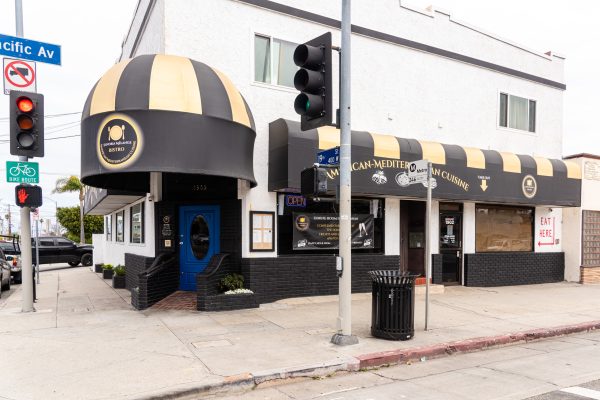
As little as twenty years ago most Americans had no idea that there was such thing as regional Italian cuisine. Now we are sophisticated enough to know that there are major variations based on different cultures, ecologies, access to historic trade routes, and other factors. However, some people are still surprised by regional differences of an area over fifty times the size of Italy – the Arab world. This extends from West Africa to the border of Persia, but for various reasons only a few of those cuisines have been available here. What we think of as Arabic food is usually Lebanese and Palestinian, closely related styles from one small region. There is much more to discover, and a recently opened restaurant in Redondo expands our options.
Azure describes itself as a Mediterranean restaurant, a vague term usually used for any mix of Southern European and Arabic food. Europe is lightly represented on Azure’s menu; there are a few Greek dishes, but the focus is on a swathe of the Arab world stretching from Turkey to Egypt. The chef is from Cairo and has brought that city’s cosmopolitan attitude to Redondo Beach.
The restaurant is decorated in a smart modern style with splashes of color accenting the white walls, with lots of room between the tables and a few semi-private spaces great for small parties. There is also a shaded patio where I enjoyed lunch on my first visit. I tried an Egyptian specialty called a feteer, which isn’t a pizza but occupies the same ecological niche. On that visit I ordered a “meat lovers’ feteer” with salami, pastrami, Italian sausage, mozzarella, tomatoes, and green peppers. What arrived was a six by six inch square of pure luxury wrapped in crisp, flaky dough. Slightly oily in the same way a good pizza is (thanks to the cheese), it was fantastic, and a good bet for a future fast food craze.
I had been intrigued by an item on the beverage menu called “hot hummus,” which turned out not to be dipping hummus served as a drink, but hot lemonade with tomato juice, cumin, and garlic steeped with whole garbanzo beans. In Egypt one usually drinks the broth and then eats the beans with a spoon. As unusual as it sounds, it’s delicious, a lemony tomato and bean soup with an exotic spicy background. It probably should be listed on the menu as a soup because it’s not what Americans think of as a beverage, but whatever it is, you should try it.
On a return visit, my friends and I dined inside in one of the semi-private spaces, which we found quite comfortable. We ordered another feteer, along with fried cauliflower and a feta and tomato dip, and, since feteers are made to order and take a while, the other items arrived first. The dip was composed of whipped feta with finely chopped tomatoes, olive oil, and a bit of thyme, and was a showcase for simple wholesome flavors. The cauliflower was a simple dish done perfectly and elevated by the tangy homemade tahini sauce that came with it. My companions were most impressed by the feteer, which they hadn’t tried before, and all agreed they’d be back for another. On our next visit we’ll probably order these same items with two or three more appetizers and make a meal of them, because that would be a delightful way to dine.
We had ordered main courses of lamb chops, meatballs in yogurt sauce, kofta kebab skewers, and eggplant casserole, all of which turned out to be generously proportioned. The lamb was a benchmark item, five medium-sized chops marinated with herbs, garlic, and pepper and nicely grilled. It was served with excellent hummus, a rice and noodle mixture, a bit of marinated onion, and salad. Kofta always shows a bit more about the kitchen – depending on where you are in the Arab world, this mix of chopped beef, lamb, and onion can have ground vegetables mixed in and heavily seasoned with herbs and paprika or be as bland as any hamburger. This one split the difference with hints of onion, bell pepper, and spices used so subtly that no single element stood out. It was the kind of thing you could keep nibbling while trying to figure out just what elusive flavor was lurking in the background and then finish without knowing the answer.
The meatballs and eggplant dishes were superficially similar, as both were served over rice with yogurt sauce in a covered crock. The delight was in the details. The beef meatballs were topped with pinenuts and relatively simple, while the garlic-tomato-yogurt sauce on the eggplant was more complex, and both were excellent. These dishes are native to the Shaam region that includes parts of Syria and Southern Turkey, and they made me want to learn more about the cuisine of the area.
The Pharaohs might have accompanied their repast with beer, Levantines with shots of anise-flavored arak brandy, devout Muslims with mint tea, but we ordered wine. The list here has new and Old World vintages by the bottle or glass, and is reasonably priced.
Several desserts are offered, including some dessert feteers, but an item on the beverage menu caught my eye. Sahlab is a sweet drink made from the orris root, and I had heard of it in Victorian English drinks but never had it. The warm, fragrant drink is similar to tapioca with a hint of raspberry, and while I ordered it for novelty’s sake I’d happily have it again.
Azure has been open for just over two months as of this writing and there are still a few things that need work. The service is still slightly shaky, but that will improve with time. More importantly, the unusual items on the menu should be described so people will be encouraged to order them. While the standard items are exceptionally well done here, there are gems on this menu that aren’t available anywhere else, and that could make Azure a dining destination from a wide radius.
Azure is at 1810 S. Pacific Coast Hwy. in Redondo. Open daily at 11 a.m., close 10 p.m. Su-Thu, 11 p.m. Fr-Sa. Free parking in attached structure, wheelchair access good, patio dining. Wine and beer served, corkage $15, many vegetarian/vegan options. No website, phone 424-275-9730.









